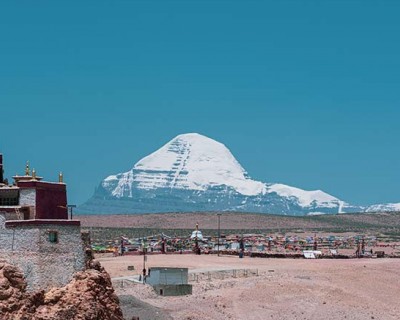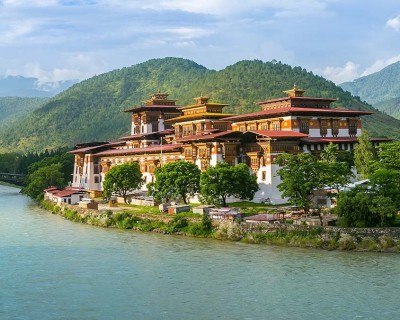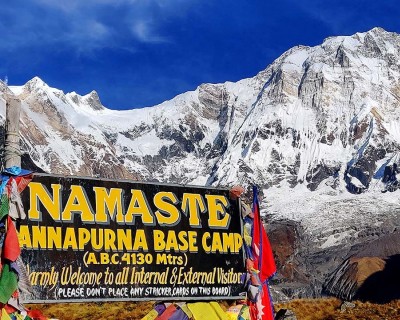Common Illnesses on the EBC Trek
Altitude Sickness
Altitude sickness is one of the most common forms of Everest Base Camp illness. When trekkers push to higher regions of the mountain without proper acclimatization, they are at risk of altitude sickness after ascending over the altitude of 3,000 meters (9,842 feet). There are three types of altitude sickness in total:
- Acute Mountain Sickness (AMS)— body is not able to adapt to reduced oxygen levels in the atmosphere
- High Altitude Pulmonary Edema (HAPE)— fluid accumulates in the lungs
- High Altitude Cerebral Edema (HACE)— brain starts swelling due to high-altitude hypoxia
HAPE and HACE are the severe forms of this high-altitude sickness that mostly occurs during mountain expeditions. For the Everest Base Camp Trek, as you don't ascend to the alpine snow, AMS is the only sickness that you will need to be careful about. Even if it is a moderate form of altitude sickness that can be cared for easily, prevention is still way better than cure. So, during your mountain adventure, you need to be watchful about the symptoms of Acute Mountain Sickness (AMS) like:
- Headache
- Nausea
- Fatigue
- Dizziness
- Difficulty in sleeping
- Loss of appetite
- Shortness of breath
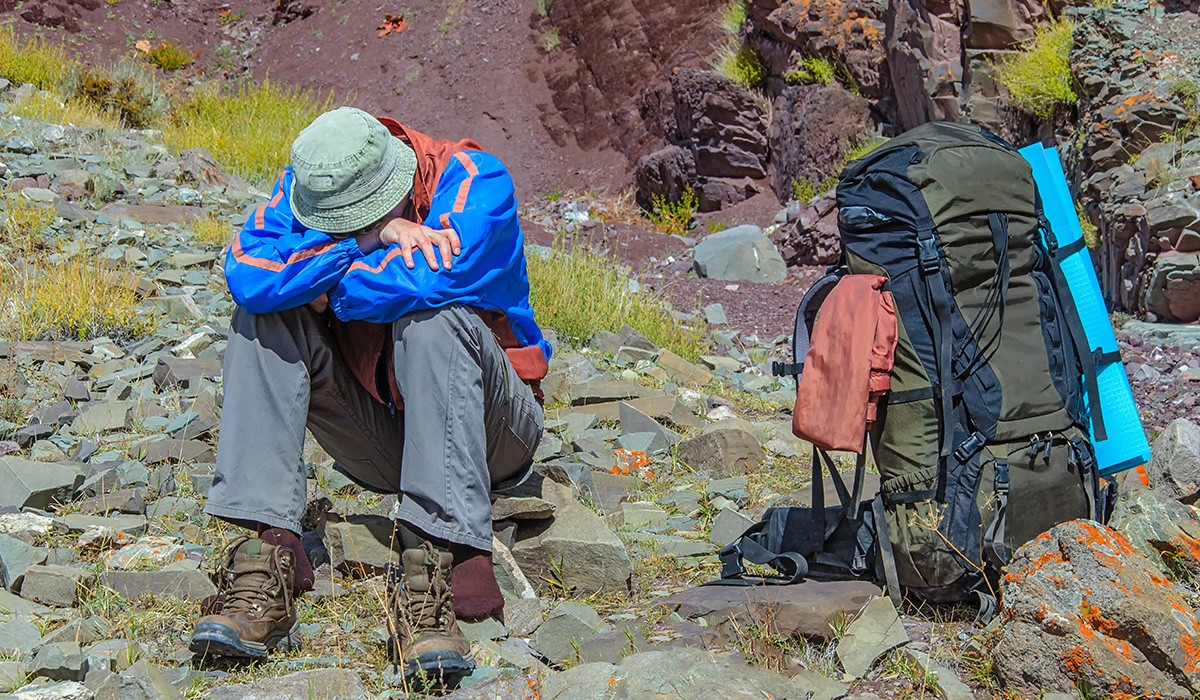
You May Like:How Do I Prepare For Altitude Sickness On The Everest Base Camp Trek?
Dehydration
Dehydration is another major Everest Base Camp sickness that trekkers generally suffer from. Due to the cold and chill climatic conditions of the mountain, the trekkers don’t feel like frequently drinking water like exploring under tropical climates. So, this neglect of enough fluid during the trek eventually leads to dehydration. Similarly, you will also be walking multiple hours on the physically demanding, rugged and uneven trails during Everest Base Camp Trek. You will lose a significant body water level with the increased physical activity.
So, if you are not careful about maintaining the body water level, you will feel exhausted and uncomfortable with the walk. On top of that, dehydration is also a primary triggering element for Acute Mountain Sickness (AMS). That is why trekkers should consume at least 3 to 4 liters of fluid during the trek. Be aware of the symptoms of dehydration like:
- Dry mouth and throat
- Fatigue
- Dizziness
- Reduce urination or dark-colored urine
- Dry lips and skin
- Headache
- Rapid breathing
- Irritability
Gastrointestinal Issues
Exploring the majestic charms of the Himalayas is certainly once in a lifetime experience. But, if you are not careful about what you put in your stomach during this trip, the overall journey may feel sour. The gastrointestinal issue is one of the basic Everest Base Camp illness symptoms when the trekkers are not careful about hygiene and sanitation. Let’s be clear: even if the Everest Base Camp Trek is one of the major trekking destinations in Nepal, it takes place in one of the isolated parts of the country.
Thus, due to the lack of proper roadway, it takes time to transfer goods here to the higher part of the mountain. That’s why you need to be careful about what you eat during the trip. Stick with the healthy local meal options that are prepared with local ingredients. It is best to avoid the meat items at the higher part of the trail. Similarly, don’t go just for the taste be careful about nutritional value and avoid greasy and oily food.
As for the drinking water, there are clean water stations throughout the route. Although the water is clean and safe to consume (you might see local drinking without any filtration), only consume water after purifying it. It is best to buy water at the teahouses that are boiled and filtered so you don’t put anything harmful in your stomach. Here are some basic symptoms of gastrointestinal issues:
- Diarrhea or vomiting
- Stomach cramps
- Bloating
- Loss of appetite
- Fatigue
- Blood in stool
- Weight loss
- Heartburn
Respiratory Infections
The cold weather of the mountain, dusty trails and communicable germs in the crowded space can cause respiratory infections. This troublesome Everest Base Camp illness can be really bothersome and dampen the mood when you are trying to enjoy the adventure. If affected by this sickness, trekkers may develop a persistent cough, sore throat and nasal congestion, which sometimes even leads to fever.
In order to prevent respiratory infection during your trek, it is important to keep yourself warm and use a mask while traversing across the dusty trails and using the shared spaces at the teahouses. Falling sick on the remote mountain trail can also be quite a bit of a hassle. So, it will be best if you avoid contact with individuals who are unwell. Here are some common symptoms of respiratory infections:
- Sore throat
- Persistent cough
- Runny nose
- Nasal congestion
- Fatigue
- Light to high fever
- Headache
- Muscle aches
- Loss of sense of smell or taste
Hypothermia
Hypothermia is a serious health condition when the body temperature drops drastically due to prolonged exposure to the cold climate. Even if this is a serious form of Everest Base Camp sickness, with proper measures, it can be easily countered. That’s why it is important to understand the climate variation during trek in the Himalayas. The lower altitudes are generally warmer. But, as you head toward the higher altitudes, the temperatures drop significantly. This happens even during the peak seasons, like spring and autumn.
Thus, it is essential to pack appropriate layers considering the temperature variation across the route. Make sure to pack warm and insulated layers. Packing buff outer layers and a down jacket is the safest bet for the trekking part in alpine (above 4,000 meters) and trans-Himalayan (above 5,000 meters) zones. Here are the symptoms of hypothermia that you need to be wary about during your trip.
- Uncontrollable shivering
- Slurred speech
- Clumsiness
- Confusion
- Weak pulse or low blood pressure
- Drowsiness
- Stiffness in muscles
- Pale, cold and dry skin
Sunburn
We have a general notion that it is not possible to suffer from sunburn while traversing to cold regions. However, sunburn is one of the most common Everest Base Camp illnesses. The UV rays are actually stronger at the higher regions regardless of the cold climatic conditions. Thus, if you are not careful during your high-altitude journey, it can cause severe sunburn. That is why it is necessary to wear protective layers of clothes, UV protection sunscreen and sunglasses to avoid sunburn during your trip.
Cover your skin with clothing and hats, also, make sure to apply sunscreen with high SPF frequently throughout the journey. It doesn’t mean you can’t sunbathe to keep your body warm under the chill climatic conditions. Just make sure the exposure isn’t for long extended periods. Here are the symptoms of sunburn that you should be careful about during your EBC exploration:
- Red painful skin spot
- Blister that may be itchy and eventually pop
- Skin may start peeling
- Skin feels hot to the touch
- Eyes may feel painful
- Fever and chills
- Skin feels painful to touch
- Swelling of skin
Snow Blindness
Similar to sunburn, snow blindness is another problematic Everest Base Camp Trek sickness that occurs due to exposure to the high-intensity UV rays reflecting off the snow. In this condition, the excessive UV rays reflecting on the snow at higher altitudes causes sunburn to the cornea of the eyes. This causes serious pain, blurry vision and makes the adventures light-sensitive.
Although it is most common during mountaineering adventures, it is important to be prepared for this during EBC Trek as well when you will be traversing across the snow-covered terrain. Thus, bringing UV protection sunglasses or goggles is very crucial to avoid this health hazard during your mountain adventure. Here are some symptoms of snow blindness that you should treat immediately:
- Pain in eyes
- Redness in the eyes
- Blurry vision
- Light sensitivity increases
- Teary and watered eyes
- Haloes around the lights
- Eyelid start twitching
- Gritty and discomforting feeling in eyes
Minor Injuries
Besides the common forms of Everest Base Camp illness, you also need to be careful about the minor injuries that might occur during the trek. This thrilling mountain journey will take you across some rugged, uneven and steep sections of the mountain. During the long hours of trek, if you are not careful with your footing or the obstacles across the route, you might sustain light injuries. Similarly, you will also need to be careful about blisters, sprains and sore muscles during your long-haul Himalayan journey.
The best way to avoid minor injuries during the trek is to prepare physically. Focus on balance and stretch exercises to comfortably navigate uneven trails. These exercises will also help you with sore muscles and you can also avoid strains by properly balancing your body’s center mass. Using trekking poles also reduces the pressure on joints and helps you keep composure. To avoid blisters, it is essential to wear well-fitted and broken-in trekking boots. Symptoms of minor injuries are as follows:
- Pain and discomfort in the affected areas
- Swelling or redness
- Bruising and bleeding
- Change in skin color
- Muscle stiffness, cramping of inflammation
- Limited range of motion
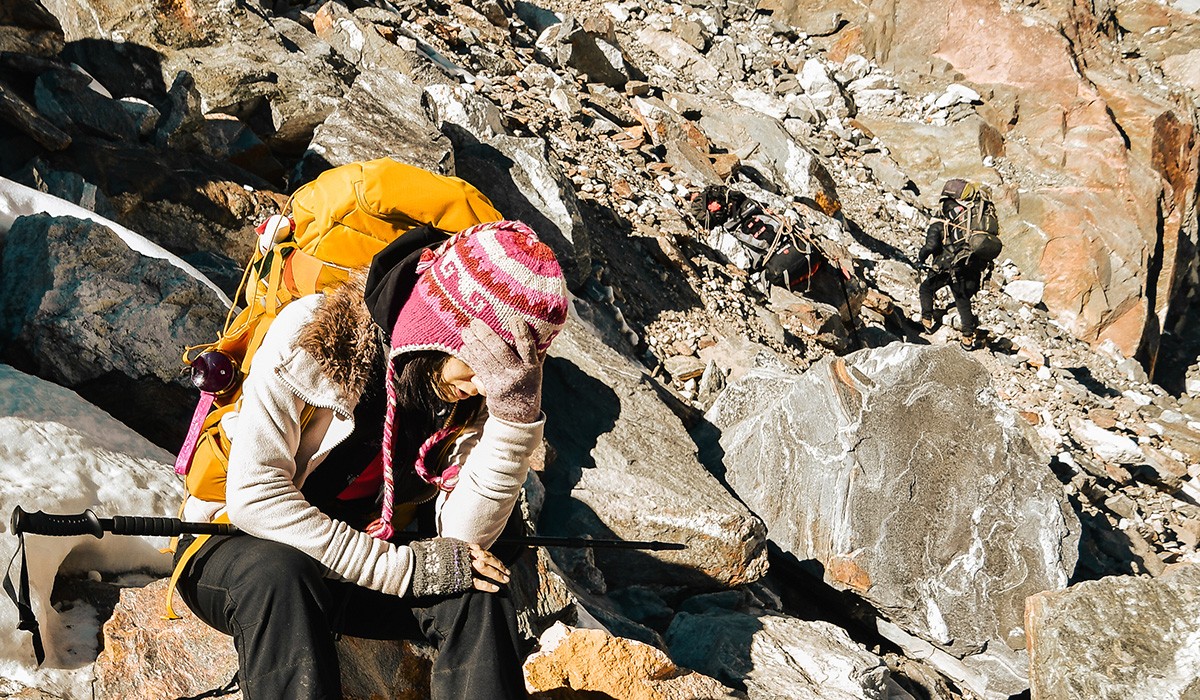
Don’t Miss: Everest Base Camp for Beginners: 7 Things You Should Know
Recognizing Symptoms Early
While doing your high-altitude trekking, it is crucial to stay aware of how your body is feeling throughout the experience. This self-awareness will help you identify the common Everest Base Camp illness and you will be able to take the countering measures immediately. You also need to understand the symptoms of the sickness may vary from person to person depending on the immune system. Thus, for the common issues on the trekking routes, such as altitude sickness, dehydration, gastrointestinal issues, respiratory infections, hypothermia, etc, you will need to understand the diverse range of symptoms.
Check out the symptoms of the common health hazards on this mountain trail in your Common Illnesses in the EBC Trek section. Early detection of the symptoms will prevent the situation from getting worse. Similarly, your team leader or guide will also be able to take necessary measures immediately without jeopardizing your health. If you start showing any of the mentioned symptoms above, don’t ignore them. Early action is better than waiting till the situation becomes more serious.
Learn More About:Everest Base Camp Trek Difficulty
Prevention Tips
As we have discussed, the common and troublesome Everest Base Camp sickness that you have to encounter during your trip. Let’s move on to the prevention section. Taking appropriate measures with consistent efforts and mindfulness will help you secure an enjoyable and memorable experience during your Himalayan adventures. We have created this prevention tips list with the help of our exceptional travel experts, veteran guides and health professionals. So, read them carefully; they may help you skip the sour memory lane due to the health hazards on this iconic route.
- You need to follow a proper acclimatization schedule so you don’t push to the higher points of the trail in a rush
- Give your body enough rest and take short breaks on the trekking trails
- Eat a healthy and balanced diet to make up for the long hours of physical activities
- Be careful about hygiene and sanitization of food (avoid meat items if possible)
- Use a filtration system and purification solution before drinking water to avoid any kind of germ infection
- Dress appropriately for the weather and make sure to pack warm layers for the higher part of the trails, even during the warmer seasons
- Take good care of your personal hygiene and sanitization
- Be cautious while using personal spaces like bathrooms and water taps
- Avoid any kind of alcoholic beverages and cigarettes during the trek
- Monitor your oxygen level and body temperature during each day of the trek
- Be alert about the Everest Base Camp weather and prepare yourself for sudden change
- Maintain a positive mindset throughout the journey and focus on enjoying the experience
- Avoid trekking during unfavorable periods like winter and monsoon, which have challenging trails
- Focus on fitness, train enough for the trek and focus on strengthening your immune system
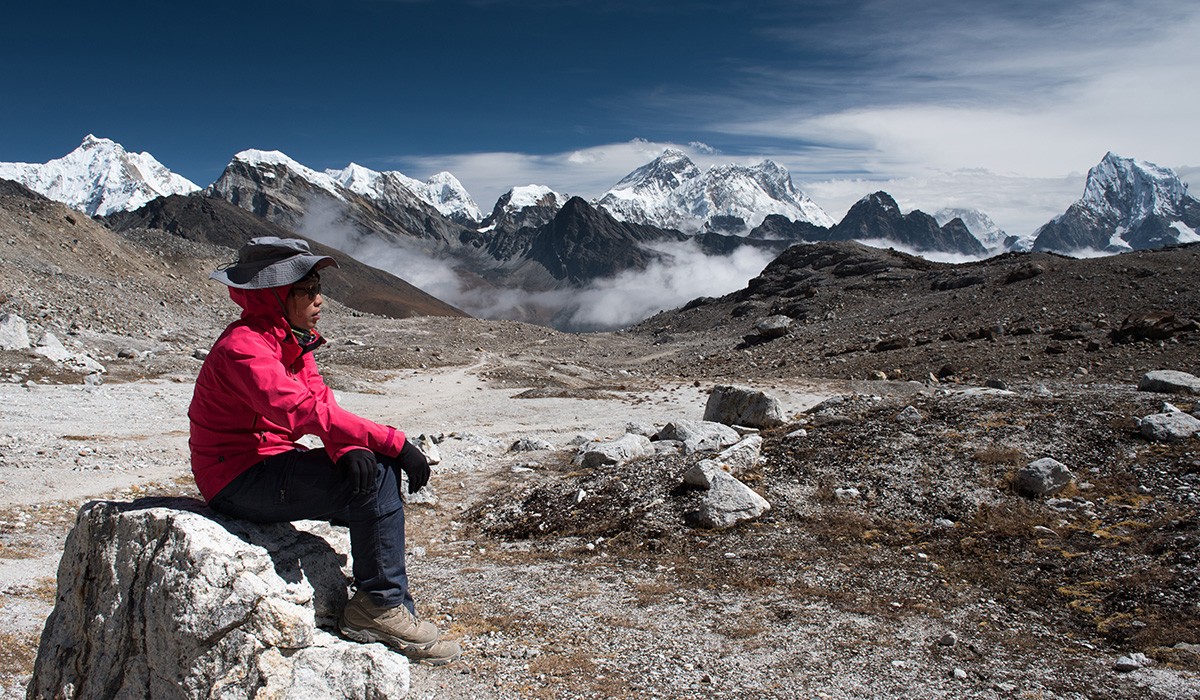
What to Do If You Get Sick?
If you are wondering what you should do if you happen to catch one of the Everest Base Camp illnesses during your adventure, there is no need to panic. There are proper steps and protocols for everything. Generally, trekking agencies like Marvel Adventure, which will be handling your trip, will monitor your health conditions throughout the experience. That’s why it is crucial to select a reputable agency for the adventure that will manage all the details of the journey and provide a valuable experience.
As the expert trekking crew is capable of providing first aid care and treating high altitude-related sickness, you will be in safe hands during your journey. If you happen to get sick or injured during the trek, there is also a well-managed chain to take care of the situation. For a better understanding, let’s discuss the steps in detail:
Rest and Communicate With Your Guide or Group: In case of any issues, communicate immediately with your guide or team leader. They will properly assess the situation and decide on the necessary medical attention.
Use First Aid or Prescribed Medication for Minor Issues: The trekking crew is equipped with an extensive first aid kit. They will provide first aid and consider your state whether if you can continue the journey or if it is necessary to sop. If you have any prescribed medication, it will be best if you bring enough supply of it.
Decision-making for Descending to Lower Altitudes: This part involves descending to the lower altitudes if the issue is persistent or transferring to a medical facility if necessary. Depending on the seriousness, the trekking crew will make the decision to transfer you to the medical center or lower altitudes.
Emergency Evacuation if Symptoms Worsen: In case if the condition is really serious, then the emergency evacuation is the only convenient option. Your trekking agency will manage and organize for the evacuation process properly, coordinating with all the involved teams. The cost of emergency evacuation is covered by your insurance.
Medical Facilities on the EBC Trail
There are basic medical facilities across the major key points in the Everest Base Camp Trekking route. However, as these establishments are on the mountainside, they are not properly equipped to handle the serious conditions. They can provide general treatment and if emergency care is necessary, then helicopter evacuation is the only option. Here are the major landmarks where more extensive medical services are available:
- Namche Bazaar: This is a major town in the region and the medical establishment here offer basic treatments for altitude sickness, injuries and infection.
- Himalayan Rescue Association Nepal (Pheriche): A non-profit organization that operates medical clinics at Pheriche Village. This is a well-known emergency clinic that treats AMS, other altitude-related sicknesses and general health issues.
- Everest ER (Everest Base Camp): During the climbing season there is a tent-based medical clinic operated at Everest Base Camp (5,364m). Offers immediate first-aid care and treatment to altitude sickness-related health hazards.
- Lukla: This is the starting point for the adventures in the Everest region and has health clinic to deal with emergencies and general ailments.
Role of Trekking Guides
An experienced trekking guide is invaluable for high-mountain exploration. During your Everest Base Camp Trek as well, this capable personnel will monitor your health and safety factors. Guides don’t only help with the logistics and navigation but are also trained to spot the symptoms of altitude sickness and other illnesses early. Thus, they are capable of making crucial decisions about your health and well-being. They also keep track of each trekker’s walking pace, hydration levels and overall health throughout the journey.
So they can easily make recommendations and take the appropriate measures immediately to ensure your experience remains seamless. Furthermore, in the event of serious illness, the guides arrange for medical assistance and evacuation, ensuring you are taken care of quickly and efficiently. That’s why doing a trek with a reputable agency or licensed guide will be an assuring factor that you are in safe hands. That way, you will be able to truly immerse in your trekking adventure without worrying about any aspect of the trip






